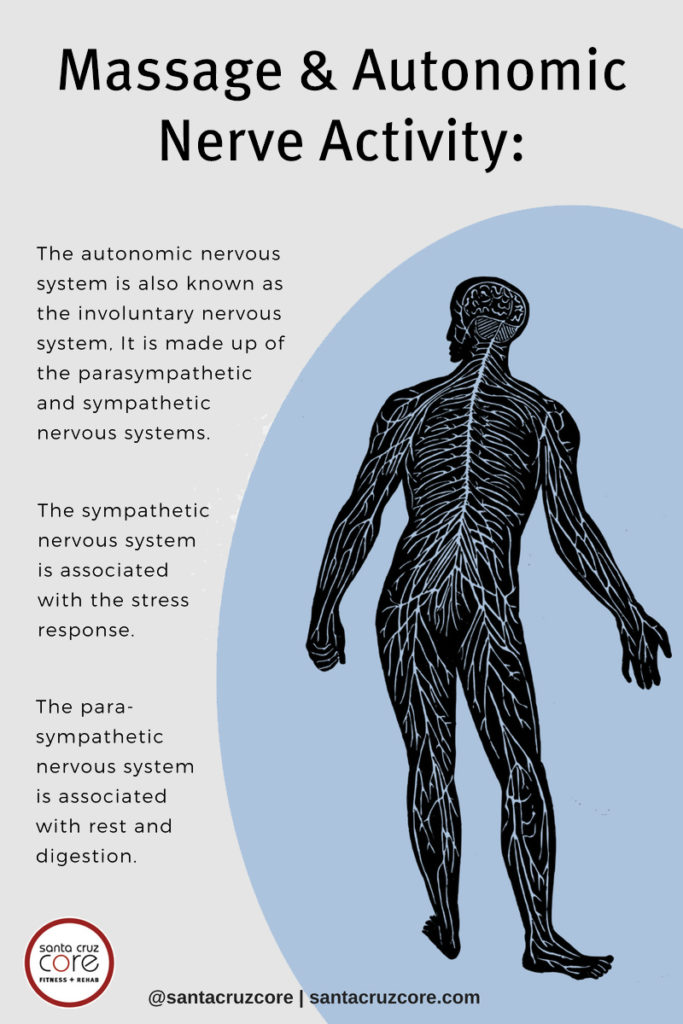Many of the benefits of massage therapy that we experience are mediated by the autonomic nervous system.
 The autonomic nervous system, also known as the involuntary nervous system, is largely involved in the physiological effects of both stress and relaxation.
The autonomic nervous system, also known as the involuntary nervous system, is largely involved in the physiological effects of both stress and relaxation.
The autonomic nervous system consists of the sympathetic and the parasympathetic nervous systems, which affect stress and relaxation respectively. These two nervous systems work in relation to one another. They control a range of physiological responses including heart rate, circulating glucose, stress hormone release, digestion, and homeostasis.
 Sympathetic Nerve Activity:
Sympathetic Nerve Activity:
The sympathetic nervous system is most associated with the stress response, also known as the fight-or-flight response. The stimulation of the sympathetic nervous system results in physiological changes. These changes then prepare the body for the stress response and physical activity. Sympathetic stimulation of the heart, for example, leads to an increase in heart rate and cardiac output (the amount of blood pumped by the heart in relation to time).
Sympathetic nerve activation also stimulates the release of norepinephrine (a stress hormone) by the adrenal glands. Norepinephrine then contributes to the elevated heart rate, to an increase in circulating glucose. This redirects much of the body’s blood flow towards skeletal muscle (like arms and legs).
This progression of sympathetic nerve activity and its effect on physiology is a major reason for some of the detrimental effects that stress has on health. Chronic sympathetic nerve activation, caused by chronic stress, anxiety, fear, anger, and strong positive emotions can negatively affect the electrical activity of the heart, contribute to unstable blood sugar, and poor digestion.
Parasympathetic Nerve Activity:
The parasympathetic nervous system is most associated with rest and digestion. While this system is active, many of the body’s passive functions take place including the digestion of food and tissue recovery. Parasympathetic nervous activity is the most associated with a state of relaxation, a lower heart-rate, and more stable blood glucose. By controlling stress levels, one can then manage blood glucose levels.
Effect of Massage on Autonomic Nerve Activity:
Massage therapy has a soothing effect on the autonomic nervous system. This is achieved through the activation of parasympathetic nerve activity which combats the adverse effects of stress.
A study published in 2011 by the Yonsei Medical Journal concluded that the application of massage and heat had a relaxing effect on the autonomic nervous system. This study consisted of 139 test subjects who received 40 minutes of treatment (heat + massage), 5 days a week, for 2 weeks. Results showed a decrease in serum levels of both cortisol and norepinephrine (the stress hormones). This, therefore, helps prove massage an effective stress reducer (1).
Get started with massage, one for $65 and 3 for $49 through August 31st, 2018*, please visit this page to claim or call 831-425-9500 today!
*Valid for up to 12 months from time of purchase, may be combined with offers, valid only for new massage clients, thank you!
If you find yourself more stressed than you’d like to be, stop by CORE for a massage! Did you know that acupuncture and even exercise can also relieve stress? Many of our services benefit your mind as well as your body.
References:
Lee, et al. “The Effects of Heat and Massage Application on Autonomic Nervous System.” NCBI, Yonsei Medical Journal, 20 Oct. 2011, https://www.ncbi.nlm.nih.gov/pmc/articles/PMC3220246/









